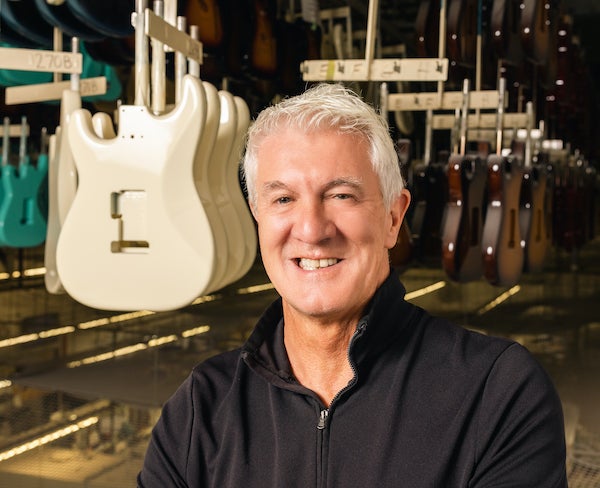Inside Fender's Plan to Rock the Guitar Industry With New Hits and Classics CEO of Fender Musical Instruments Andy Mooney is placing bets on new avenues and repeat performances for an iconic American brand.
By Mike Errico
Opinions expressed by Entrepreneur contributors are their own.

"At my very first town hall in Scottsdale, I'm getting introduced as the new CEO, and all they know about me is that I've worked at Nike, I've worked at Disney," Fender chief executive Andy Mooney begins, settling into a story enhanced by his gruff Scottish accent. "And I start to tell them about the first Stratocaster I had, and how I modified it to place the metal pickup down like [Deep Purple guitarist] Ritchie Blackmore did, and how I added the extended tremolo bar, and so forth. And at the end of the presentation, one of the more tenured employees came up to me and says, "I really thought I was going to hate you…but you might actually get it." He deadpans, "Which I took as a compliment."
Related: He Makes Guitars Out of Torn-Down Buildings in Detroit
In the midst of a very uncertain historical moment, guitars have been having a good run: the pandemic spiked instrument sales, reinvigorated hobbyists and broadened the fanbase to include new players. But this is more than a business success to Mooney, who spent his twenties pursuing a career as a professional musician before taking on corporate roles. He remains an avid guitar collector (he had his eye on Pink Floyd guitarist David Gilmour's coveted Fender before it fetched a record price at auction), and since 2015, he has balanced a sensitivity to history with a sharp eye toward what's next for the iconic brand.
In our conversation, we spoke about brand equity, data-driven business decisions, and the reason you want your competitors to succeed, too.
Does it impact the culture at Fender to know that their CEO has a longstanding relationship with the company's flagship product?
It does. I think any CEO needs an emotional connection, or at least an intellectual connection, to the product. I've been fortunate to have been associated with brands—Nike, Disney, Fender—with very high emotional connections. The plus side is that you can expand the dimension of those brands almost infinitely. The flip side is when there's such an emotional connection that you have to be careful not to embalm the brand. Oftentimes at Disney, I would hear, "No, you can't do that, you can't do this, you can't do that." And I used to remind people, "Let's take a walk down memory lane, to 1955. This man, Roy Disney, did what you would expect him to do—he released an animated movie [Lady and the Tramp]. But he also won an Oscar for a documentary short. And oh, by the way, in his spare time he opened Disneyland." In the same way, there were periods at Nike where I heard, "Are we really going to be that big in women's aerobics? Are we really going to do hiking footwear? Nobody's ever going to buy that from us." And I kind of founded the equipment business up there, which everybody said would be a disaster. But when I left, it was a billion-dollar business, because the product resonated with the consumers, and people believed in the brand.

You're quoted as saying, "Products are deposits or withdrawals in the bank of brand equity."
I wish I could say it was my quote, but when I joined Disney, one of the first meetings I had was with Steve Jobs at Pixar. And Steve grilled people, especially new people. He asked me, "What do you think makes great brands?" And I said, "I think it's the cumulative effect of great product." And he said, "Good answer. The only thing I would add is that every single product is either a deposit or a withdrawal."
Who else inspires your thinking as a CEO?
I tend to select attributes that I really admire. Steve, bless his heart, voiced opinions as facts. Today, Elon Musk is probably his equivalent, except, you know, with a social media foghorn. But Steve really was a futurist, a purist. He was projecting way ahead and saying, "This is where it's going, and we are going to be the leaders of where it's going." And I think that is a quality—true vision—I really concentrate on with my group: Where are people going? Where is the future going to take us?
In order to answer a brand-defining question like that, you tend to compile large amounts of data. How do you engage with the data once you have it?
When I joined Fender in 2015, I asked the most basic question: Who's buying our guitars? Everybody had an opinion, but nobody had any data. So we gathered it, and out of that came five insights that guide everything we've done since. Number one: 45% of the guitars that we sell every year go to first-time players. This was a big "aha" moment. Two: There's a 90% abandonment rate for first-time players, which was not surprising, but it was good to get a hard number on it. Three: 50% of new players are women, which was a complete shocker to the company. Four: Women were predominantly buying acoustic guitars. Five: Women were buying guitars online because in the brick-and-mortar stores there was nobody to relate to, and they weren't getting treated well. So all of those insights influenced our marketing, our Artist signature series—and it essentially created [proprietary education platform] Fender Play. Thinking about that 90% abandonment rate, we figured if we could help reduce it by just one percentage point, it would be a significant needle mover. Remember, the 10% of the salmon that make it through the dam, as it were, have a lifetime value, or LTV, of $10,000 [per customer]. They're the ones who drive the hardware business.
Related: Want to Be Happy? Embrace Insanity.
Data must have aided in your decision to reinvigorate the Jackson—a Fender-owned brand of electric guitars with roots in 80s hair metal. Why Jackson, and why now?
I have a few good friends over at [ticketing company] LiveNation who I talk to all the time. I studied their press releases and saw that the biggest genre of growth in live music is heavy metal. There's a truly global legion of fans out there. Metal is also home for the highest percentage of guitar aficionados and virtuoso players. They'll never fess up to it, but they will end up buying the exact brand their heroes play, sometimes in the exact color. So I said, "Let's commit deeper to the category."
There was also a nostalgic component to the decision. We were seeing a significant uptick in demand in our custom shop business, coupled with requests from artists who were now well-established. A classic case in point is Slipknot—you've got Mick Thompson playing a signature Jackson, which he grew up on, and on the other side of the stage Jim Root is playing a signature [Fender-owned] Charvel. And I said, "Well, if these guys are reconnecting with the brand they played when they were kids, and there are people willing to pay five, six, or seven thousand dollars for guitars in the custom shop, there's going to be demand for solid, American-made guitars built for working musicians in the $2,000 to $3,000 price point." And based on what we're seeing, I think that belief is absolutely going to hold true.
Related: This Legendary Music Retailer Made Millions Online. So Why Did They Open a Studio?
The guitar continues to defy fashion trends and keeps finding creative applications in today's music. Looking forward, how do you combine the love of a player with the mindset of a data analyst to craft a business philosophy to take Fender into the future?
With Fender, I set out with a primary objective to create industry growth. Because if all I do is steal market share from Gibson or PRS, that's great for me, but it doesn't grow the category. I like swimming with a rising tide—that's what happened at Nike, and at Disney, and I'm happy to say that since 2015 we've been swimming with the tide here at Fender, too.











